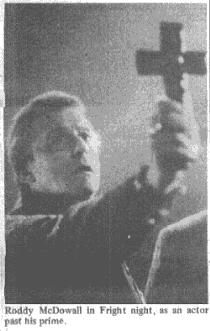"It's like being a trick diver," says Roddy McDowall, when asked how a good actor goes about playing a bad actor. "First you have to be a good diver. Before you can play a bad actor, you have to be a good actor." Then, with characteristic modesty, he qualifies his analogy: "At least, I think so."
McDowall, who plays the former horror-film star Peter Vincent in Columbia Pictures' Fright Night, may be the only one of the film's cast and crew to voice such a reservation about his tremendous talent. As one of the few child stars to have successfully mastered the transition to adult actor, McDowall has, in the process, become part of our collective film memory.
Despite the multiplicity of roles he has played during his career, McDowall insists that the part of Peter Vincent in Fright Night was something new. "I based him," McDowall says, "on some characters I'd seen onstage as a child -- actors who were not very good actors, from a rather stentorian (sort of) school of acting, but basically not very talented men. Peter Vincent is essentially a very, very bad actor who's been well known for a series of films in which he played one character and one character only -- the Fearless Vampire Killer. He's a rather sweet, frightened fellow, a sort of cowardly lion, and he's seen in the movie as he is now and as he was in his old films. I've never played a part like it."
Born in England, McDowall had already begun to carve out a niche for himself as a child actor in British films before his family moved to America. It was here, however, that the sad-eyed boy with the grown-up demeanor imprinted himself on film history in such classics as My Friend Flicka, Lassie Come Home and How Green Was My Valley.
McDowall downplays his early Hollywood fame: "The thing that makes someone a star is that nobody was like them before, and it takes something besides talent. Oh, I was famous enough, but I was never a great, colossal star."
It is a measure of McDowall's ongoing concern for his craft that he views his career as a continuum, but as film historian Mel Schuster points out, "Transcending a pre-pubescent identity is an achievement demanding total commitment to the task, an adaptability, or more importantly, a suitability to a new social/time demand."
In the 1950's, McDowall shed his image as a juvenile and expanded into myriad roles on the Broadway stage (including Misalliance, No Time for Sergeants, Compulsion, Camelot) and on live television, which provided him, the actor says, "with opportunities and role variety that existed nowhere else." In 1960, McDowall crowned his transitional decade in New York with both a Tony Award, for his role in Jean Anouilh's The Fighting Cock, and an Emmy for his role in NBC'S Night Without Honor.
Since then, the actor, known for both his consistency and professionalism, has worked constantly in theater, film and television. During the past 20 years, McDowall has guest-starred in almost every major television series and dozens of television movies. His feature film credits, which number well over 100, include roles in Midnight Lace, The Longest Day, Cleopatra, The Greatest Story Ever Told, The Loved One, Inside Daisy Clover, four of the Planet of the Apes films, The Life and Times of Judge Roy Bean, Funny Lady and Class of 1984.
|

